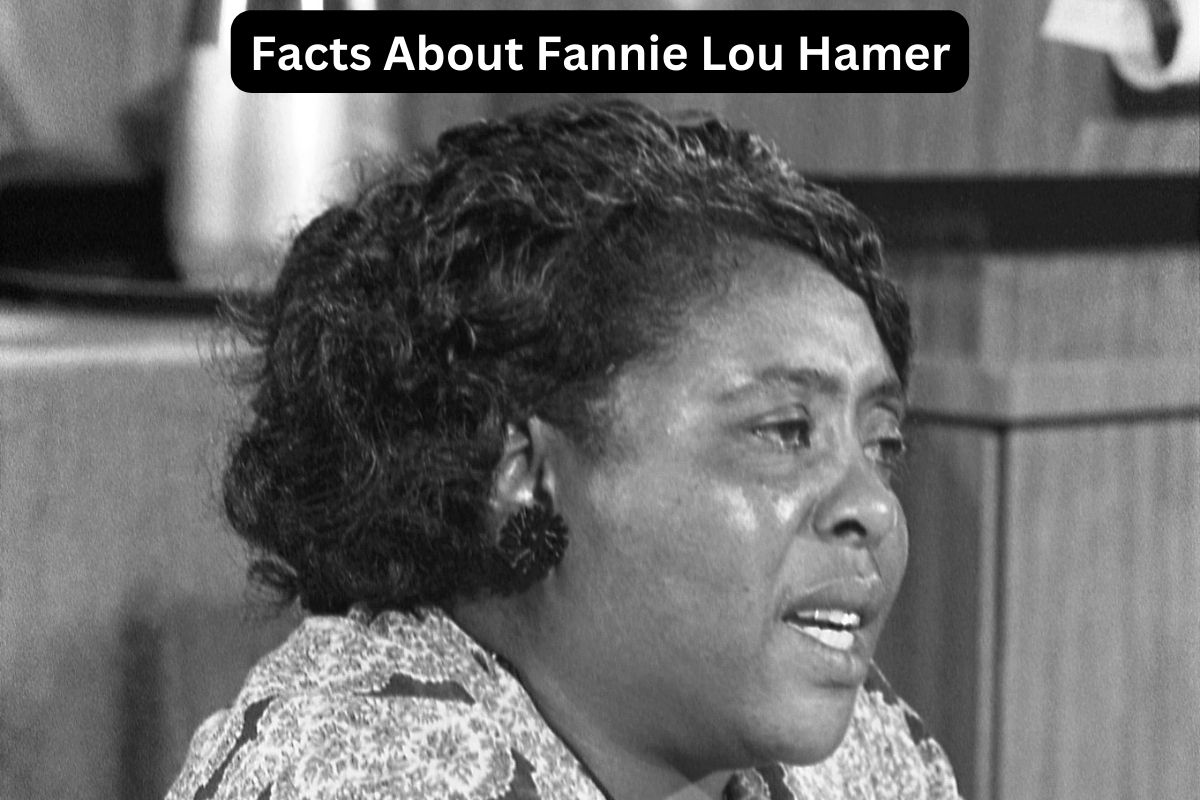Fannie Lou Hamer was an influential American civil rights activist who played a crucial role in the fight for racial equality and voting rights during the 1960s.
Born into poverty in Mississippi, Hamer’s experiences as a sharecropper fueled her determination to challenge systemic discrimination.
She co-founded the Mississippi Freedom Democratic Party and delivered a powerful speech at the 1964 Democratic National Convention, shedding light on the struggles faced by African Americans in the South.
Hamer’s activism and advocacy left an enduring impact on the Civil Rights Movement and continue to inspire activists today.
Fannie Lou Hamer Facts
1. Fannie Lou Hamer was an American civil rights activist
Fannie Lou Hamer was an American civil rights activist who dedicated her life to fighting for racial equality and social justice.

2. She was born on October 6, 1917, in Mississippi
Born on October 6, 1917, in Montgomery County, Mississippi, she emerged as a prominent figure during the Civil Rights Movement in the 1960s.
Also Read: Fannie Lou Hamer Accomplishments
Hamer’s upbringing was marked by poverty and the struggles of rural life. She was the youngest of 20 children in her family, and her parents were sharecroppers who worked on a plantation.
Growing up in a racially segregated and economically disadvantaged environment, she witnessed firsthand the injustices faced by African Americans in the Jim Crow South.
3. Hamer was the youngest of 20 children in her family
She was born into a large family, being the youngest of 20 children. Coming from a large household in rural Mississippi, Hamer grew up amidst the challenges of poverty and limited resources.
Being the youngest sibling, she likely experienced a unique perspective and dynamic within her family. The size of her family undoubtedly influenced her early experiences and shaped her understanding of community, resilience, and the struggles faced by African Americans in the segregated South.
4. She worked as a sharecropper on a plantation
As a young girl, Fannie Lou Hamer began working in the fields alongside her parents as a sharecropper. Sharecropping was a system in which laborers, typically African Americans, rented land and farming supplies from landowners in exchange for a share of the crops produced.
This system often perpetuated cycles of debt and poverty, trapping many African Americans in a cycle of economic exploitation and limited opportunities.
Hamer’s experience as a sharecropper shaped her understanding of the structural inequalities that African Americans faced and fueled her determination to bring about change.
5. Hamer co-founded the Mississippi Freedom Democratic Party (MFDP)
Fannie Lou Hamer co-founded the Mississippi Freedom Democratic Party (MFDP) in 1964. The MFDP aimed to challenge the all-white Mississippi Democratic Party, which systematically excluded African Americans from participating in the political process.
The MFDP sought to give a voice and representation to African American voters and address the racial discrimination prevalent in Mississippi politics at the time.
6. She led the MFDP’s delegation to the Democratic National Convention in 1964
As a leader of the MFDP, Hamer played a pivotal role in organizing voter registration drives and encouraging African Americans to exercise their right to vote.
She and other activists faced significant obstacles, including poll taxes, literacy tests, and intimidation tactics, which were used to suppress the African American vote.
Despite facing violence and threats, Hamer persevered and tirelessly worked to empower her community through political participation.
7. Hamer delivered a powerful speech at the convention
In 1964, Fannie Lou Hamer led the MFDP’s delegation to the Democratic National Convention in Atlantic City, New Jersey.
Their goal was to challenge the seating of the all-white Mississippi Democratic Party’s delegates and demand recognition for the MFDP as the legitimate representatives of Mississippi’s African American voters.
Hamer’s powerful testimony before the Credentials Committee brought attention to the brutalities and discrimination faced by African Americans in the South, including her own experiences of being beaten and arrested for attempting to register to vote.
8. Her activism led to changes within the Democratic Party
The impact of Fannie Lou Hamer’s activism was significant, particularly within the Democratic Party. Her courageous stand at the Democratic National Convention prompted the party to take notice of the racial inequalities and systemic injustices faced by African Americans.
The “Fannie Lou Hamer Rule” adopted by the party was an acknowledgment of the need for greater inclusivity and representation of minority communities. This rule helped pave the way for greater diversity within the Democratic Party and played a role in shaping future political conventions.
9. She co-founded the National Women’s Political Caucus in 1971
In addition to her work in the civil rights movement, Fannie Lou Hamer made significant contributions to women’s rights and political empowerment. In 1971, she co-founded the National Women’s Political Caucus (NWPC).
The NWPC aimed to increase the political influence of women and advocate for women’s rights. Hamer recognized the importance of gender equality and believed that women’s voices needed to be heard and respected in the political sphere.
Her involvement in the NWPC demonstrated her commitment to fighting for equal rights on multiple fronts.
10. Fannie Lou Hamer passed away on March 14, 1977
Fannie Lou Hamer’s tireless activism and dedication to the cause of justice and equality left a lasting impact on the civil rights movement.
Her courage in the face of violence and intimidation, along with her ability to articulate the experiences and aspirations of African Americans, made her a revered figure among activists and a symbol of hope for marginalized communities.
Despite facing numerous challenges, she remained steadfast in her pursuit of equal rights and voting rights for all. Her legacy continues to inspire and motivate activists in the ongoing struggle for racial and social justice. Sadly, Fannie Lou Hamer passed away on March 14, 1977, but her indomitable spirit and contributions continue to resonate and shape the fight for equality to this day.
